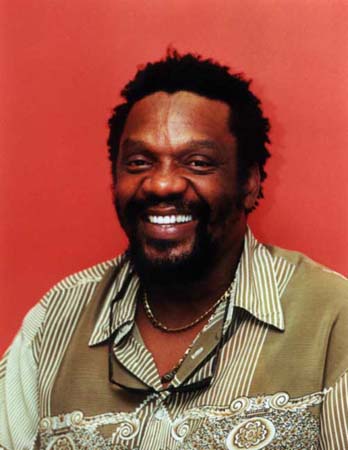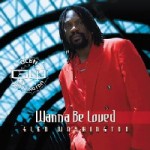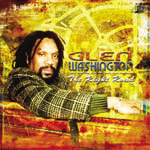 Have you noticed how some artists are all about the hype? The latest trend? The latest dance and the latest fashion? After conjuring up that image, do a 180 degree turn, and you’ll land on Glen Washington. Solid. Enduring. Talented. Passionate. Gimmick free.
Have you noticed how some artists are all about the hype? The latest trend? The latest dance and the latest fashion? After conjuring up that image, do a 180 degree turn, and you’ll land on Glen Washington. Solid. Enduring. Talented. Passionate. Gimmick free.
Washington may not be interested in the latest hype, but that doesn’t mean he’s not fashionable. His smooth baritone voice has the power to mesmerize any audience, young or old. Just ask the ladies.
Whether he is singing a love song or a cultural song, Washington delivers his lyrics with an effortless ease. There is a striking similarity to Beres Hammond—the raspy timbre, and the smooth delivery is, on occasion, indistinguishable.
With 25 years of experience in the music business, Glenroy Washington started out as a singer, became a drummer, and then returned to singing in the late 1990s. He credits his success to his upbringing in Clarendon parish in Jamaica under the auspices of his strict, religious grandmother. He asserts that she instilled many important values in him–respecting women and elders, and mentoring children, are only a couple.
In the early 1970s as the lead singer for the band “35 Incorporated,” Washington learned to play drums from none other than Culture’s lead singer Joseph Hill, who was the drummer at the time. When Hill left, Washington filled the slot and became a singing drummer.
Over the years, he gained most of his recognition as a session drummer playing with different bands such as The Avengers, The Titans, Calabash, and Happiness Unlimited. He migrated to the U.S. with Happiness Unlimited to work with Stevie Wonder.
Although Washington had a hit song in 1978 called “Rockers Not Crackers,” he didn’t return to his solo singing career until 1997. That year he released his debut “Brother to Brother” produced by Coxsone Dodd; the follow-up CD, “Next to You,” on VP Records produced his next hit, the heartfelt “Kindness for Weakness.”
 Within the last two years, Washington released two strong albums, “Wanna Be Loved,” [VP, 2004] and “The Right Road” [ Jetstar, 2003]. The award-winning singer has traveled the world backing other singers on drums, and now tours as a featured artist. With the 14 albums he has released in the last seven years, plus countless singles, there is definitely no lack of material to draw from.
Within the last two years, Washington released two strong albums, “Wanna Be Loved,” [VP, 2004] and “The Right Road” [ Jetstar, 2003]. The award-winning singer has traveled the world backing other singers on drums, and now tours as a featured artist. With the 14 albums he has released in the last seven years, plus countless singles, there is definitely no lack of material to draw from.
I had the opportunity to interview Washington over the phone on October 11, 2004 while he was visiting the VP Records’ offices in New York. As you can see by his words, Washington ’s passion about music, his diplomatic nature, and his sense of humor all came to the forefront. He was very generous about sharing parts of his inner world with me, even if it took some digging!
LG: What was growing up in Clarendon like?
Glen: Well, I was a youth that was raised by my grandmother and growing up in Clarendon was a good thing because it was wholesome—I had to go to church, I had to do all that good stuff–all the things a good little boy is supposed to do. My singing background [comes] from being around the church singing in all the choirs.
LG: Was your grandmother really strict with you?
GW: Yep. She was very strict, but very fair. As a matter of fact, everything that I do reflects back to how I was raised.
LG: What do you think some of the values are that she instilled in you?
GW: She taught me how to be respectful of people—older people. How to know that I should take care of the children and how to respect women.
LG: That’s important… I was reading that you really got your drumming start with Joseph Hill of Culture.
GW: Yes, he was my coach back then. As a matter of fact, he was the drummer of the first band I sang with. And then when he left, I got encumbered by the drummer because I was the only one who was able to hold a beat. We had a whole bunch of little shows that we had to do when the drummer left so I just had to get out from out in the front to behind the drums and try to play a thing. That’s how come I was known as the singing drummer for many years.
LG: So what was your relationship like with Joseph?
GW: We were just really good friends. We grew up together, you know. He was older than us—I keep saying us because it was a bunch of guys, some of them scattered all over different places in the world—but we grew in the music together from going back and forth to Studio One, to Channel One, to Joe Gibbs’ Records. It was that experience and we threw a couple different bands together. At one time, I became his drummer in a band that was called Sons of Jah.
LG: Sons of Jah?
GW: Yeah, in Spanish Town.
LG: When was that?
GW: That was like 1976, somewhere in there.
LG: What do you think was one thing that you learned from him that still sticks with you to this day?
GW: Well, I learned many things from Joseph but things that stick is his determination and when you love something, to keep going at it until you can make something of it.
LG: Persistence?
GW: Yeah.
LG: One of the things that I think is so amazing in your music is that it’s really genuine and it’s really inspired, whether it’s a love song or a cultural song. So I ask you, where does the inspiration usually come from?
GW: As for the love songs, the inspiration comes from women. Because I LOVE women! [ laughs ]
LG: From your personal experience or your friends’ experiences?
GW: Probably a little bit of both. Yes, direct and personal experience. Also I can emulate another person’s life. I could watch a movie and emulate the lead role… And the serious roots songs come from actual reality—things that are happening in the world and things I see happening around me. You know, everyday life.
 LG: What do you think is really pressing right now that you want to sing about?
LG: What do you think is really pressing right now that you want to sing about?
GW: [laughs] In these times you’ve got to be careful about what you sing about!
LG: It’s true.
GW: You have to be careful what you sing about cause people can take it the wrong way. But there are so many things to sing about… I choose special songs to write as a songwriter. I can’t sing just anything because I’m going to look at myself and listen to myself and say, “If I was the buying public, would I buy this?” And if I agree with myself, then that’s what I’ll sing about.
LG: That’s a good test. Can you tell me about a past experience that you think has been your best recording experience in your over twenty years in the business?
GW: Everything I’ve been doing since 1997 has been a good experience. I don’t know which one…
LG: Can you think of a time when you went into the studio and really felt like you had a groove going?
GW: Yeah, I remember when we did “Don’t Take My Kindness for Weakness.” That was awesome—it just came so natural because I was given a tape with two rhythms on it. Then I recorded “Call Me Baby” and “Don’t Take My Kindness for Weakness.” Those were the first two rhythms Lloyd Campbell gave to me.
LG: And what studio was that?
GW: [laughs] I took them home. They were the only two songs I sat down and wrote here in America . All of the other ones were written in Jamaica on that album “Get Next to Me.” “Don’t Take My Kindness for Weakness” was really one of the most awesome songs that I wrote and it was so simple.
LG: Sometimes the simplest ones are the best. Do you still drum at all?
GW: Only for therapy. I believe that drumming and having sex are the only two things that can exercise your whole body! [ laughs ] And because at times I try to abstain, I’d rather play drums to keep my strength up!
 LG: [laughs] You now have two albums out—one on JetStar and one on VP—so tell me a bit about how these two albums differ from one another.
LG: [laughs] You now have two albums out—one on JetStar and one on VP—so tell me a bit about how these two albums differ from one another.
GW: The one that is playing on JetStar right now is actually one that was done from last year [2003]… Last year [2003] I was quiet on VP but this year [2004] is the “ Wanna Be Loved.” “The Right Road ” was done for Jetstar [in 2003]. That was a long time coming because we’ve been doing that album for over two years.
LG: So tell the people who haven’t heard the one on VP what they can expect.
GW: Well, there’s a song for each and every one and this time, we didn’t rush it. We timely took each song as a project, one by one. Each song has its own character. Everybody will be pleased because there’s a song for everyone. If I should say so myself, it’s a very good album!
LG: I know you probably hate this question, but I’m going to ask it anyway. I hear over and over–and I also agree–that there’s a very similar sound and comparison to Beres Hammond. What do you make of that comparison?
GW: I hear that from time to time, but you know what? I do take that as a compliment. Beres Hammond is someone that I really respect as a good songwriter and a good voice in the business. He’s a great act and I take it as a great compliment.
LG: It’s like Luciano and Bushman. Those two sound alike to me as well.
GW: True. I know there’s no one that sounds like Glen Washington.
LG: Who knows, maybe in the next 10 years there will be a newcomer, and everyone will say, “Oh that guy sounds so much like Glen Washington!”
GW: Somebody’s gonna get that! [laughs and makes his trademark sound.] Any day I wake up and don’t hear that I think something’s wrong with me!
LG: So take me through your songwriting process. Maybe you can walk me through it—you wake up, you want to write a song…
GW: You know most of my songs are written late at night because I’m nocturnal. I don’t usually sleep at night because I’m up. I am on the computer ‘cause there’s a website I have to check out and read all the notes that people send to me, so most times I do that at nighttime. I always get some good vibes to write when it’s quiet–nice and serene. I will have a rhythm and just put it on and put the CD on repeat. Keep playing over and over and I sit there with my pen and it just goes. As soon as I start to write, it just going. It just starts to flow and the lyrics just start to come together.
LG: [In disbelief] For every song?!
GW: Yeah, for every song. I write songs in different instances, like I would come to the studio without anything and if a rhythm is playing and if you can play the rhythm for at least half an hour, I will have a song.
LG: So whose rhythms do you mostly use?
GW: I work with Joe Frazier Records and Lloyd Campbell. Actually if I hear a rhythm that I want to sing on I will tell them and then we’ll get it made. By the time the rhythm is played, I am ready to voice.
LG: Changing the subject, what advice can you give men out there dealing with the ladies?
GW: That they just have to be respectful of the ladies and let them have their say. Women are people too and they have opinions. I notice nowadays that women are very opinionated, so if they’re saying something that probably don’t make sense to you, listen anyway. [laughs]. ‘Cause that’s how I am—I am a good listener. I listen and even if what they’re saying is silly, I am still going to listen and I try not to offend anybody.
LG: That’s a good plan.
GW: Yeah, it’s a good plan. [laughs] It’s a great plan! I stay out of trouble like that.
LG: So what are your thoughts about the current state of Jamaican music right now?
GW: Bwai, we really need to improve on the type of lyrics that we do, that we put out as songwriters, entertainers and performers. We have to improve on that. Make sure that the lyrics are strong, sturdy lyrics with a good background. Lyrics that won’t offend anyone. We need to go back to the good ol ’ days! Back to the good ol ’ days when reaggae music was all about love, unity, and equality and justice for all. As opposed to telling someone that “I want to beat you down”—the hype. To each his own—I am about love and unity.
LG: Do you think some of the criticism that Jamaican dancehall artists (e.g. Elephant Man, Beenie Man, Capleton …) are getting is justified?
GW: Do I think it’s justified? Like I said, to each his own. I don’t know if I would want to make a comment on that ‘cause I might offend somebody, so I wouldn’t make a comment on that. I’m just saying I wouldn’t say anything about that.
LG: I hear you. What would you like to pass down to your children?
GW: The same things that were instilled in me by my grandma. Love your neighbor. Love your brothers, your sisters, and yourself. Be respectful of people.
LG: Are there any last things you want to tell the massive out there about the “Wanna Be Loved” album?
GW: I want people to go out there and check it. Don’t just look at the label. Go out there and buy the album and have a great experience. You’ll be “pull- joying” it for years to come. When you enjoy, it finish and done, but when you “pull-joy,” you get the fullness of it. Listen to the words. It’s not all about the boom boom boom.
Glen Washington currently lives in South Florida. When he’s not writing music, he’s staying up late reading guestbook entries on his website. To read along with him, visit www.glenwashington.net





